Undergrads Draft Bill to "Prescribe" Housing for the Homeless
Why wait until after graduation to change the world?
After “eye-opening” experiences volunteering with homeless Bostonians, students in Debra Harkins’ spring 2017 Community Psychology course decided they needed to do more to solve the problem.
Their efforts resulted in a bill now pending in the Massachusetts Legislature proposing a creative change to health care funding -- freeing up Medicaid funds to let doctors “prescribe” temporary housing for chronically homeless patients, increasing compliance and encouraging preventive treatment over costly emergency care.
Service Learning Brings Awareness
“I’m from Haiti originally,” says Etianna Etienne, Class of 2019. “Even though we don’t have much, we know how to share and help each other. In the U.S. we have more resources and opportunities to help.”
Students in the Community Psychology class fulfill their service learning requirement working with community organizations. Etienne served as an ambassador for Spare Change News, a publication run by homeless people, and got to know current and former homeless staffers in Boston. Keynessa Nazaire, class of 2018, helped the paper increase visibility by working on its Twitter and Facebook accounts. Amanda Ricko, class of 2018, tutored housing-insecure high school students in math and chemistry through the Homeless Education Resource Network.
“I’m a sociology major and a psychology minor,” says Ricko. “Being able to have my eyes opened through service learning has helped me grow within my major. I know I want to make a difference.
Taking Action
After a spate of snow days kept the class from meeting last winter, Harkins challenged the class to use the time on a special project: Using pending Hawaiian legislation as a model, craft a bill that would help Massachusetts homeless people to access affordable housing.
“When Professor Harkins presented the idea to the class, we just thought it would be an exercise for the grade, but it quickly became more than that,” says Etienne.
“We didn’t know the first thing about writing a bill,” says Nazaire. “But we loved the idea because we’d been working with homeless people and kids all semester.”
The class drafted a bill that would allow doctors to use Medicaid to “prescribe” supportive housing services for chronically homeless individuals.
The students’ research showed that the Boston Health Care for the Homeless Program provides health care to approximately 12,000 homeless people annually across Greater Boston. For those with complex health conditions, housing instability can be a significant barrier to regular health care access, resulting in excessive use of expensive emergency, inpatient, and crisis services. The dual goals of the bill are to provide more effective care to the homeless population and reduce overall health care costs for the commonwealth.
Being Heard
Ricko comes from a politically active family, and her grandmother encouraged her to reach out to her state representatives about the bill. State Rep. Brendan Crighton -- who represents Ricko’s home district and is an alumnus of Suffolk University’s MPA program -- agreed to meet with the class.
“This is a big challenge for a lot of Massachusetts communities,” says Crighton. “People are being priced out of housing. Health care is forty to fifty percent of our spending. If folks had a stable home life it would make it easier to get preventive care.”
The class prepared detailed materials to support their proposed bill. Ricko – who describes herself as “not a talker unless I’m passionate about something” – practiced her pitch for three hours in Harkins’ office before Crighton came to class.
“I walked in expecting to have a general discussion about government, but we had a more policy-specific conversation. They made a direct ask,” says Crighton.
After the meeting, students say Crighton appeared noncommittal about supporting the bill.
“I prepared myself for the bill to be rejected, but I lobbied even more afterward,” says Ricko. “He emailed me the night before our last class to tell me the bill was being filed.”
When Ricko announced the news in class, everyone cheered -- and Harkins canceled the final -- but there was still a long way to go.
The Way Forward
Since Crighton and Rep. Daniel Cahill, another Suffolk alumnus, revised and filed Bill H.3933 An Act relative to homelessness and Medicaid last spring, the students have received an education in the legislative process.
The bill went to the Public Health Committee and passed a major milestone in December 2017 when a public hearing was held at the State House. Ricko and several other students spoke on behalf of the bill and continue to advocate for its eventual passage. A report from the Public Health Committee is expected in mid-May.
This semester, Harkins enlisted a new group of Community Psychology students to help keep the momentum going. They’ve garnered the support of five state legislators so far.
“The bill is filed, but now we need to bring light to it,” says Ricko. “We need people to contact their legislators in support of the bill so it doesn’t get ignored. Boston could be helping the homeless get better care and saving money at the same time.”

Contact
Greg Gatlin
Office of Public Affairs
617-573-8428
Andrea Grant
Office of Public Affairs
617-573-8410



